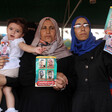The Electronic Intifada Gaza Strip 29 September 2016

Family and friends of Palestinians abducted in Egypt call for the men’s release in September 2015.
APA imagesWafaa Abu Libdah experienced both shock and relief when she saw photographs of her son Abdeldayim in detention.
“When I saw the photo, I screamed ‘Abdeldayim is still alive,’” she said. Then she had a closer look and noticed that he was being held in unsanitary conditions.
“The ground is wet, the whole place is dirty and my son is half naked,” she said, viewing the pictures on a mobile phone. “Why is Egypt doing this?”
Abdeldayim was among four Palestinians abducted by masked men after entering Egypt in August 2015. They had passed through the Rafah crossing on the Gaza-Egypt border and were on a bus heading to Cairo International Airport when the abduction occurred.
Last month — one year following their abduction — Al Jazeera published images of Abdeldayim and Yasir Zannoun, another of the four abductees, being detained, reportedly in Cairo.
Wafaa, Abdeldayim’s mother, has had trouble sleeping since her son was abducted. “I want my only son back,” she said. “I want to hug him again — even just once before I die.”
Abeldayim and the three other abductees had, according to press reports, been involved in the armed wing of Hamas.
They were destined for Turkey when abducted. Abdeldayim was planning to further his studies in software engineering there.
When the masked men boarded the bus from which Abdeldayim was taken, they called out his name and that of the three others. Passengers who were on the same bus have said that the masked men spoke with Egyptian accents.
Silence
Yet the Egyptian authorities have mainly been silent about the abductions. No official comment was made by the Egyptian government at the time.
However, it was reported that the Egyptian security services believed the abductions were carried out by Province of Sinai, a group affiliated with Islamic State.
Many people in Gaza suspect that the abductions were the result of cooperation between Israel and Egypt. One theory is that the men may have been taken hostage to pressure Hamas into releasing the few Israeli soldiers who were captured during Israel’s 2014 attack on Gaza.
Abu Obeida, a spokesperson for Hamas’ armed wing, the Qassam Brigades, stated earlier this year that four Israeli soldiers were being held in Gaza.
Abu Obeida insisted that no negotiations were being held with Israel about the captured soldiers. Israel would have to “pay a price” for any information on them, he added.
Egypt manages the Rafah crossing in coordination with Israel. Since a siege was imposed on Gaza in 2007, the crossing has been frequently closed. Last year, it was completely shut during the months of February, April and July.
“Blackmail”
Hamas has been in contact with the Cairo authorities following the abductions.
Salah al-Baradwil, a leading member of Hamas, has called on Egypt to press charges against the men if it holds any evidence against them.
He has accused Egypt of making “harsh demands” of Hamas in return for the men’s release. One of the demands was that Hamas take action against Islamic State in the Sinai. That would mean Hamas — a party to which the current Egyptian government is hostile — being required to fight inside Egyptian territory.
Another demand was that Hamas would hand over a number of people that the Egyptians wished to arrest. Hamas was also instructed to place additional security personnel on the Rafah border.
Egypt is resorting to “implicit blackmail,” al-Bardawil told The Electronic Intifada. He also said that the Egyptian authorities have confirmed to Hamas that they abducted the four men.
Yasir Zannoun left Gaza to receive medical treatment, according to his mother Mariam.
“He was traveling in a legal way,” she said. “He has health problems. They get so bad in the winter that his body is racked with pain.”

The family of Yasir Zannoun say he was abducted while attempting to reach Turkey for medical treatment.
APA imagesYasir was injured in his legs when Israel shelled Rafah, his home area, during its November 2012 bombardment of Gaza. He also suffers from back problems, his mother said.
The families of the two other abductees, Hussain al-Zibdah and Abdullah Abu Jabin, remain in the dark about their whereabouts.
Hussain’s brother Anwar said that he had to try and comfort his own children after the images of the other two abductees were published. A young nephew of Hussain wanted to know why his uncle could not be seen in the pictures.
“I had to say that Hussain might have gone to the bathroom or fallen asleep,” said Anwar.
Hussain, too, had been traveling for medical reasons, according to his family. He has knee pains and a stomach condition.
“Our family is very sad at the moment,” said Anwar. “We wish that we could have seen Hussain in the photograph, so that we would know he is alive.”
Hamza Abu Eltarabesh is a freelance journalist and writer from Gaza.





